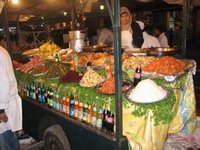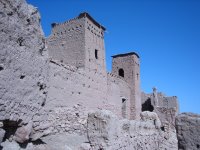After a harrowing departure from Mali, I arrived at the Casablanca airport, delighted to find ATMs that worked and people relatively happy to give information (the French influence notwithstanding). I made it downstairs to the train station to buy my ticket to Marrakech, and from there, to Berber country in the Atlas mountains. The train wasn’t due to leave for a while, so I settled in.
I was surprised to hear American English with a bit of an accent. I started speaking with Rahul and found out his friend could not join him as planned. We agreed to go to Marrakech together. Rahul explained that he and his friend were booked for an excursion across the Atlas Mountains, to a small town, Zagora, where they would take an overnight camel trip to the desert. Not having anything particularly crucial on my calendar, I offered to accompany him.

 A stall
A stall
We got off the train and took a taxi to the main square, the Medina, beyond which is a conglomeration of bazaars, restaurants, shops, craftsmen, food stalls, cart vendors and street musicians. Winding through a myriad of alleyways filled with colors, textiles, spices, and everyone wanting to sell you something, we came to our small but charming inn.
We set out to discover the square of Marrakech. An explosion of sights and sounds epitomizes the square, with carts of dates, nuts, figs and lines of fruit juice stalls. Rahul is a shopaholic; it took time to get past the first few small carpet and jewelry shops. He is also an excellent bargainer, rarely able to leave a shop without a conquest. In one of the carpet places, we were asked to stay for Moroccan tea (a heavily sugared mint tea, more commonly drunk than water), an invitation I would accept many times. We sat at one of the many picnic tables spread out over the square where different groups cooked essentially the same excellent, foods: brochettes, couscous, salads, marinated vegetables, etc. Eating is done late.

 Ait Benhaddou
Ait Benhaddou
Our driver to get to Zagora was Muhammed, a popular name, so popular that every man is called Muhammed. The trip through the Atlas Mountains was nothing short of breathtaking. We stopped for tea an hour into the trip, then for lunch and later at an old Kasbah, Ait Benhaddou, which we reached by mule. At Zagora, we got on the camels. Even though it was COLD, the desert at night needs to be experienced, just for the brilliant stars. When we arrived, our camel guide brought us tea. I practiced speaking French with the man who stays at the tents, prepares the food, and makes sure we are taken care of.
The next day we took a long, beautiful and pleasant drive back to Marrakech, where I saw my first hammam – a spa for the common person, to get very clean. You shower, someone scrubs you with a rough sponge (often sea salt as well). For more money, you can get an oil massage, sometimes a variety of herbal wraps. After this sublime experience, we continued exploring and came upon a group of Berber musicians.
Berbers comprise about two-thirds of the population of Morocco. They are a mix of races: Saharan, European, Asian. They speak several dialects and are known for their crafts (particularly handwoven rugs), their spices and their hospitality. For me, however, the Berbers are the music of Morocco. You cannot be Berber and not have music. Each Berber I met (generally men – the women stay to themselves) plays several instruments. When no instrument is available, a number of things substitute.
I decided to head to Essaouira the next morning, an allegedly lovely and recommended little ocean town.
You can read more of the author's travels at her blog.